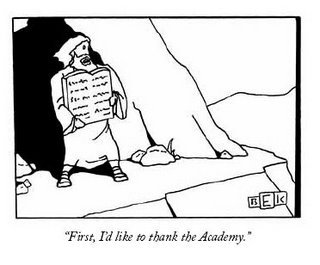People give same speeches- "oh my god" et al. Women wear similar see-through gowns. In the front row, you see Jack Nicholson making same gestures every year. Since 9/11, black actors tend to get more awards.
In Maureen Dowd's words: "...you see no furrowed brows, no regretful winces, no unflattering wrinkles, no admissions of imperfection, no qualms about puffing up what you really have, no visible signs of hard lessons learned, and no desire to confront reality in the mirror."
It all looks and sounds so artificial. And worse boringly predictable. Is such a continuity reassuring? Is this much touted soft power- alternate to nukes- that is required to rule the world?
 Artist : Bruce Erik Kaplan The New Yorker 21 Mar 1994
Artist : Bruce Erik Kaplan The New Yorker 21 Mar 1994
No comments:
Post a Comment